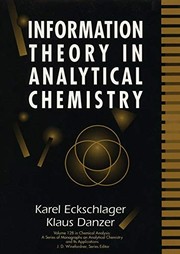Check nearby libraries
Buy this book

Regarded as a seminal work in chemometrics, Information Theory as Applied to Chemical Analysis by Karel Eckscklager and Vladimir Stepanek shed light on the importance of information theory, stressing that the very mechanisms of information gathering are key to the quality of the analytical data collected. Continuing that examination, this new volume, Information Theory in Analytical Chemistry, looks at the practical applications of information theory, especially as a tool for optimizing chemical analysis.
Complete with up-to-date examples from diverse areas such as toxicology, environmental science, and metallurgy, the book provides a workable framework for developing, optimizing, and assessing analytical procedures.
Layer by layer, the analytical process is dismantled - and reassembled - so the reader develops a genuine, practice-oriented grasp of just how information theory shapes the chemical analysis process.
Beginning with the fundamentals of information theory and analytical chemistry, the book then considers the systemic nature of chemical analysis, examining each of its facets: identification of components, trace analysis, qualitative analysis, quantitative analysis, multicomponent analysis, microanalysis, and surface or structure analysis.
Up-to-date, detailed discussion includes: identification of an individual component or a group of compounds; effect of a priori knowledge of the sample on the information gain of the result; importance of calibration methods and reference material and their net effect on the precision and accuracy of results; choice of the optimum analytical method, criteria of selection; quality control, external and internal quality assurance; chemical homogeneity testing.
Particularly important in trace and multivariate analysis, the book also sheds light on the information content inherent in analytical instrumentation, contrasting it with the true information gains of the analysis. Essential to understanding the individual steps of analytical process, this distinction allows for better evaluation and optimization of each step, including calibration and signal processing.
The book also assesses the information contribution of key chemometric methods, such as cluster analysis, pattern recognition, and factorial data analysis, useful in multivariate or multicomponent analysis. This discussion, in turn, provides insight into the true character of multivariate data analysis, revealing it as not simply a string of single-component analyses done simultaneously, but rather a fragile, potentially bias-ridden mechanism with unique interpretive potential of its own.
Complete with tables, diagrams, and examples, Information Theory in Analytical Chemistry is a practical handbook of enhanced analytical techniques that can sharply improve the quality of data collection as well as a user's understanding of the significance of information theory in each step of the entire chemical analysis process.
Check nearby libraries
Buy this book

Previews available in: English
Subjects
Information theory in chemistry, Dataprocessing, Quimica analitica, Chemometrie, Chemometrics, Theorie information, Analyse qualitative (chimie), Analytische Chemie, Informationstheorie, Informatietheorie, Data-analyse, Chimiometrie, Analyse quantitative (chimie), Information, Theorie de l', en chimie, Chimie analytique, Chemistry, analytic| Edition | Availability |
|---|---|
| 1 |
aaaa
|
Book Details
Edition Notes
Classifications
The Physical Object
ID Numbers
Community Reviews (0)
Feedback?History
- Created November 2, 2008
- 8 revisions
Wikipedia citation
×CloseCopy and paste this code into your Wikipedia page. Need help?
| August 2, 2024 | Edited by MARC Bot | import existing book |
| October 4, 2021 | Edited by ImportBot | import existing book |
| November 20, 2020 | Edited by MARC Bot | import existing book |
| May 31, 2020 | Edited by ImportBot | import existing book |
| November 2, 2008 | Created by ImportBot | Imported from Talis record |









